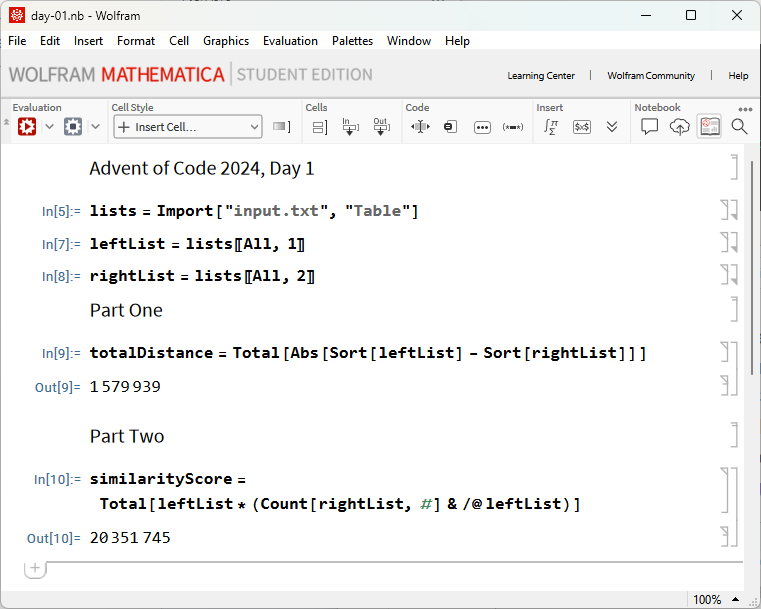Mathematica for my Ph.D.
• Posted in: Ph.D., Wolfram Language
I have been using Wolfram Engine Community Edition (free) to learn Wolfram Language through my participation in Advent of Code. The free engine only comes with the Wolfram kernel and interfaces for command line (WolframScript), web apps, Python, C, and Java. This allows for programming in code editors and notebook interfaces (e.g., Jupyter). That’s why I was using VS Code to practice Wolfram Language. The VS Code extension runs an instance of the kernel to offer features such as syntax highlighting, diagnostics, and formatting. In fact, I had an issue with the extension’s linter. I was also using the feature-rich WLJS Notebook that was developed specifically for Wolfram Language and is compatible with the free engine.
Since I’ve been liking the Wolfram Language, I decided to use it for my Ph.D. thesis. I was, however, concerned about the usage limitations of the Community Edition license. Wolfram Research states that the free engine is licensed for “non-production use” (see their licensing FAQ). This includes the development phase of commercial and non-commercial products, and forbids use in production environments even for non-commercial projects. I did not find details about use for scientific research.
I contacted someone from Wolfram Research to ask questions about licensing for students. They said that both the free engine and Mathematica Student Edition allow students to produce outputs for theses and research articles. In particular, for the publication of articles, both licenses require the user to reference the Wolfram product. For example:
Wolfram Research, Inc., Mathematica, Version 14.1, Champaign, IL (2024).
Note that the publication of results generated with those Wolfram products is not allowed for professors, faculty members, or researchers as part of their job (because they get paid for that). They have to purchase an academic or government license.
This all means that the free engine is sufficient for me. However, I wanted to take my use of the Wolfram Language a step further, and yesterday I purchased a student license of Wolfram Mathematica. Students pay only 4% of a full commercial license and get the same interfaces of the free engine plus the powerful Wolfram Notebook interface and Wolfram Cloud access. Additionally, the student license allows the user to install Mathematica on up to 2 machines.
I’m still learning how to use the Wolfram Notebook, but so far I think it’s fantastic that it formats the code without the user inserting whitespace (see, e.g., input 10 in the figure below). The VS Code extension, on the contrary, breaks the expressions at questionable places (indeed, I manually reformat my Wolfram code when posting it on my blog). Xah Lee discussed further on the significance of whitespace in programming languages.
